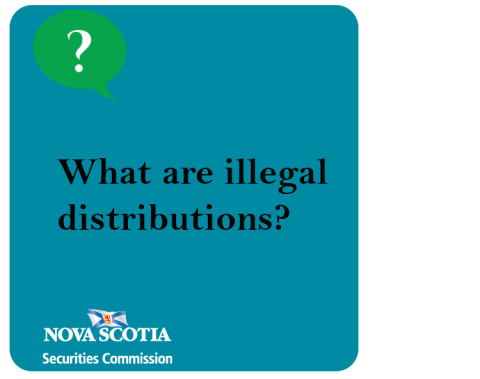Submitted by nsscadmin on

Illegal distributions refer to the sale of securities, usually shares, that have not complied with securities laws around registration, trading and/or disclosure. The trading of securities, or shares, is highly regulated. This includes the first-time securities are being offered and the sales and resales that might come after that. An illegal distribution relates to the first time securities are being sold or offered, but it could also have very real consequences on an investors ability to resell those investments.
Often someone promoting and selling an illegal distribution is not registered with a securities regulator. They misrepresent the investment as legitimate, and they fraudulently use the investment to fund some type of a scam, like a Ponzi scheme or affinity fraud.
Here’s an example of an illegal distribution. A private company attempts to raise funds by selling shares to the public – your first red flag. In doing so, they tell potential investors that the company will soon “go pubic” – your second red flag. It is a violation of securities laws to promote that a company is going public without meeting strict requirements.
The company never files a prospectus, or a disclosure document with the regulators, which was needed to allow the sale of securities – your third red flag. They file some forms, such as reports of exempt trades, stating that they were selling only to close friends, family members, business associates and/or accredited investors – a potentially viable exemption, but only if used properly. The company advertised this investment opportunity on the radio, TV, Facebook and in newspapers, and ultimately many of the people who bought in were not close friends or family members, or they did not meet the financial requirement to be accredited investors. By not filing a prospectus and by not meeting the exemption requirements shares sold were an illegal distribution.
